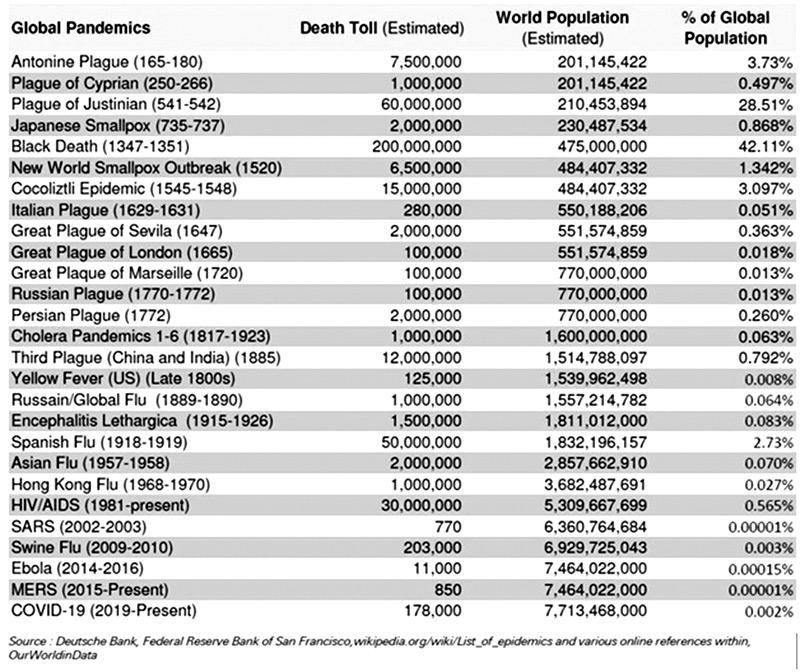
With the exception of the Black Death from 1347-1351 where 200 million lives and almost half of the world’s population perished and the Spanish Flu (1918/19) with over 50 million casualties, all other recent flu epidemics of the new millennium have something in common.
The mortality rates as a percentage of the global population is less than 1%, in fact they range from 0.00001% (SARS) to 0.003% (Swine Flu). Covid-19 (at the time of writing) has claimed 0.002% lives of the total population. But what else do these figures tell us?
The Coronavirus pandemic outperforms by far the extent of a globally united reaction compared with other viruses in the past two decades. Medical pundits are basically divided into two factions, one group which advocates harsher and more stringent measures to curb the spread of the virus, while the other group which claims that the Coronavirus does not present an imminent threat to human health.
Patients died and the cause was diagnosed as Covid-19. But did they die with the coronavirus or did they die as a result of the virus? This puts the focus directly on the prevailing health condition of the people who carry the virus. The question is whether the virus is the ultimate cause of death or are previously existing health conditions the actual cause of death. This topic is being heavily and controversially debated in medical circles worldwide.
The first German casualty
The consideration of unfavourable health conditions came to the limelight with the first German Covid-19 casualty in February. The patient was 84 and suffered from end-stage cancer, was a chain smoker and suffered from high blood pressure as well. The day he expired the coroner attested the presence of Covid-19 in his body and the media publicised this death as the first Corona related death in Germany.
In Germany the number of Coronavirus cases has surpassed 157,770; deaths 5,976 (3.8%) and the number who recovered stands at 114,500.
Even in the US it became a recent hot topic when the New York Governor Cuomo claimed a significantly higher number of Covid-19 casualties compared with other US States. New York virtually became the epicenter of Covid-19 mortality cases, this in sharp contrast to other US States. President Trump regularly disputed these figures by stating that even ‘normal’ death cases are counted into the Covid-19 statistics for political reasons.
It seems, the all important question nowadays is: Are all the containment measures implemented by most of the world’s governments adequately justified to fight Covid-19?
And why past pandemics did not trigger comparable drastic action by world governments?
Taking only the past five global pandemics into consideration, the most interesting is the SARS epidemic in 2002/2003, which was declared a pandemic by the WHO in the same year. Governments worldwide followed the WHO recommendations and ordered large amounts of vaccines recommended by the WHO. Vaccines worth billions of US Dollars had been stored in countries around the world. Later, when the previously anticipated impact with a large number of victims, fortunately, did not occur, the WHO and affiliated organisations became silent.
Over 760 casualties worldwide as a result of SARS were ultimately recorded. The Severe Acute Respiratory Syndrome (SARS) mortality rate counted for a mere 0.00001% of the world population. All the vaccines worth billions had to be destroyed since it became of no use.
Taking a comparison to the current pandemic Covid-19, here again a huge number of people may have been infected but fortunately the death toll as a result of Covid-19 remains in the range of 2 to 5 % which is in near comparison to the regular normal flues, Virologists claim
Bill Gates predicted the virus – he will present the vaccine too
If a vaccine appears on the horizon with the prospect of curing the virus and following Bill Gates vision of vaccinating the whole world, then over seven billion doses would be needed. The Pharma conglomerate which will generate and sell the vaccines is most likely one of Bill Gates enterprises, experts say.
Japan’s Nobel prize winning Professor of Medicine, Professor Dr. Tasuku Honjo, recently created a sensation by saying that the Coronavirus is not natural.
“If it is natural, it wouldn’t have adversely affected the entire world like this. Because, as per nature, temperature is not the same in all countries. If it is natural, it would adversely affect only those countries having the same temperature as China. Instead, it is spreading in a country like Switzerland, in the same way it is spreading in the desert areas. Whereas if it were natural, it would have spread in cold places, but died in hot places.
He said, “I have done 40 years of research on animals and viruses. It is not natural. It is manufactured and the virus is completely artificial. I have worked for four years in the Wuhan laboratory in China. I am fully acquainted with all the staff of that laboratory. I have been phoning them all, after the Coronavirus surfaced. But all their phones have been dead for the past three months. It is now understood that all these lab technicians have died.”
Based on my knowledge and research todate, I can say this with 100% confidence - that the Coronavirus is not natural. It did not come from bats. China manufactured it. If what I am saying today is proved false now or even after my death, the government can withdraw my Nobel Prize. China is lying and this truth will one day be revealed to everyone”.
Harvard University’s links to Chinese Research Labs
This strong statement found a positive echo in the United States where investigations had been launched into the involvement of prestigious universities such as Harvard and Wuhan Test Labs cooperation. Two Chinese born US citizens were recently arrested by the US authorities and one Harvard Professor is being investigated over these links and joint lab tests.
The writer is the Head of AGSEP Research and a Social Scientist
